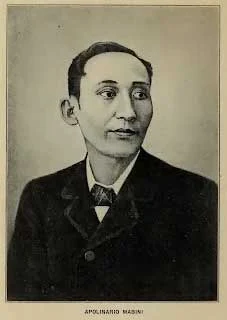A 1920 Biography of Apolinario Mabini Part I
PART I
PART I | PART II
From a 1920 publication entitled “Prose Selections” of the Department of Public Instruction and Bureau of Education, we extract this easy to read story of the life of Batangueño hero Apolinario Mabini. The biography was written less as a historical sketch and more as reading material for students of secondary-level English.
In the book’s foreword, Bureau of Education Director W. W. Marquardt wrote that this biography “was prepared by the members of the committee on secondary English with the help of several outsiders.” Below is the full text of the biography. The pagination provided is the same as in the book for the convenience of researchers. The full citation will be under the “Notes and references” section at the bottom of this post.
[p. 7]
Although difficult of attainment,
May be realized through constant endeavor
And honest effort.”
Apolinario Mabini, the Filipino patriot and philosopher of the Philippine Revolutionary period, was born July 22, 1864. He was the second of the eight sons of Inocencio Mabini and Dionisia Maranan, who lived in Talaga, a small barrio of Tanauan, Batangas, and who supported their family by cultivating a small plot of land upon which they raised rice and corn for home consumption and a little garlic and sugar cane for sale.
Apolinario’s father, though unschooled, was a man of worth and prominence in his community, having held at one time the office of cabeza de barangay of Talaga. His mother, the daughter of the village school teacher, could read and write, and she appreciated the value of an education.
Apolinario’s parents were strict and exacting with their sons, using the rod when necessary, yet desirous that their sons should have all the advantages which a life of hard work and a meager income made possible. They toiled in the fields early and late in order to provide the best they could for their children.
Apolinario, even as a small boy, was studious. Although in perfect health, he was sad and silent and liked to sit alone to meditate, taking little pleasure in any of the children's games. He was obedient and was not inclined to quarrel, yet he was always ready to defend a child who had been mistreated by others. In one month's time he learned the alphabet, the syllabary, and the rosary from his mother and was so anxious to learn more that she permitted him to stop herding carabaos and to go for a time as a visitor with his elder brother to his grandfather's school in Talaga. Apolinario paid such close attention to the lessons taught that at the end of the first week he knew more about them than did his brother. This surprised and delighted his grandfather, who persuaded the boy's parents to let him continue his studies.
From his grandfather Apolinario learned reading, writing, and the rudiments of arithmetic. He studied with great zeal
[p. 8]
at school and at home. In order to obtain some degree of solitude and quiet in the Mabini one-room dwelling, he used to sit on the floor with a blanket pulled over his head, his book on his knee.
When Apolinario was about ten years old, he had learned all his grandfather could teach him. To his simple-minded parents, his progress seemed wonderful. They began to hope that someday, their son would become a priest. Following the advice of the grandfather, they sent the boy to school in Tanauan, where he began the long struggle for an education which occupied the greater part of his life.
In Tanauan, he earned his board and lodging by working as a muchacho in the household of a tailor. The first year, he studied primary work in a lay school conducted by Simplicio Avelino, who is said to have been severe and unsympathetic with his inquiring pupil. The boy complained to his father that he was not taught the meaning of the exercises which he was required to memorize and asked permission to transfer to the church school. When his father learned that Avelino had flogged the boy apparently without cause, the transfer was made.
During the first three years of what was then called the secondary course, which was classic and Roman Catholic, the Filipino priest and director, Valerio Malabanan, did all he could to stimulate the reflection and the genius of his earnest pupil. Mabini repaid the priest by doing excellent work in all of his studies. During the third year, in the competition for a scholarship offered by the college, San Juan de Letran de Manila, he won first place, a silver medal, and a diploma of honor for the course in universal history.
Although Apolinario was by nature more studious and quieter than most boys of his age, he no doubt had similar desires; but because of his serious-mindedness he was made to see their triviality and to abandon them. In an unpublished manuscript, he says:
When I began the secondary course, I longed to ask my parents for good clothes for the Christmas holidays, pointing out the example of my companions. In order to satisfy my longing, my mother sold all her coffee which she had gathered at harvest time in the barrio of Papaya, Lipa, and brought to me every bit of the money in order that I might buy whatever pleased me. That show of abnegation and affection moved me so much that I desisted in my desire of buying luxurious clothing, since I suspected that, with the money, she had given me a very part of her life and blood.
PART I | PART II

